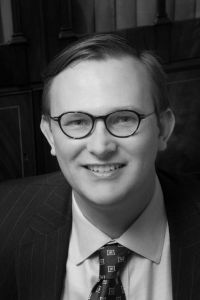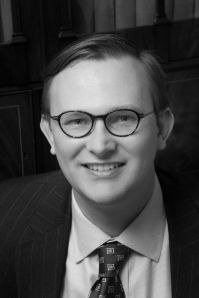Mark Zunac is associate professor in the Department of Languages and Literatures at the University of Wisconsin-Whitewater. Editor of Literature and the Conservative Ideal, he researches revolution, writing, and the rise of intellectual conservatism in Britain following the French Revolution. He received his Ph.D. from Marquette University in 2008.
AM: James Seaton is a good friend. He and I began corresponding roughly a decade ago, and we first met in person about six years ago at the Russell Kirk Center for Cultural Renewal in Mecosta, Michigan. His edition of Santayana had just come out with Yale University Press, and he was there to give a lecture on it. Seaton opens his essay for your volume with the following sentence: “Neither Henry James nor George Santayana were active participants in the politics of their time.” Don’t you think there’s something inherently conservative in this very distance from one’s own cultural and political moment? I’m thinking of Kirk’s admonition that conservatism is about the rejection of ideology.
MZ: It was actually James Seaton who, some time ago, in an innocuous but characteristically trenchant review of the Norton Anthology of Theory and Criticism published in The Weekly Standard, provided for me the framework for thinking deeply about literature’s authenticity and its exploitation by postmodern criticism. I very regrettably lacked a lot of exposure to more traditional approaches to literature and, while I instinctively eschewed the most obscure theoretics, I remained unaware that the critic could do more than scamper around the edges of territory claimed by Jürgen Habermas and Paul de Man. To Kirk’s point, I think I had always rejected the ideology – I just wasn’t fully aware that there might be a viable alternative to it.
I do think there is something to be said for one’s distance from the cultural and political moment. The conservative disposition doesn’t really lend itself well to the act of politics, and this is perhaps why conservatives have been consistently rolled in nearly every public debate over culture for the last half-century. Being always on the defensive and lacking the language to explain the intuitive – Lee Harris calls this the “visceral code” – puts the conservative at a rhetorical, if not moral, disadvantage. For me, the everyday analogy to Seaton’s statement is the conservative tendency to focus on the admittedly prosaic underpinnings of civic life – largely the familial and the associational. As we are witnessing with the ever-increasing presence of the state in the daily lives of individuals, the absence of participation in politics by those whose disposition might be called “conservative” is conspicuous.
AM: I remember where I was when I read Seaton’s review that you mention. In his book Cultural Conservatism, Political Liberalism, in the context of remarks about E. D. Hirsch, he says that “’[c]ultural literacy’ would be particularly valuable for those now termed the ‘culturally disadvantaged’ in achieving individual economic mobility,” and he adds that the “spread of cultural literacy would also promote political democracy, since discussion can only take place on the basis of at least some shared assumptions and common vocabulary.” Do you agree with this?
MZ: I would agree wholeheartedly. There has been much invested, however, in facilitating a kind of cultural amnesia. Some of it has been inadvertent, but much of it has not. As reflexive relativism has taken hold, any semblance of commonality has been superseded by historical moral equivalencies. Consequently, we are left with little more than recriminations and collective guilt. Western culture perhaps has much to atone for, but past transgressions cannot be the sole basis for self-definition. There just may be certain shared values and traditions that could serve as the basis for a common culture and a source of pride, but it is often more expedient to assign particular beliefs and behaviors to discrete and easily identifiable groups.
This may be cynical, but I think there is much to be gained politically – the recent election notwithstanding – from the veneration of difference. I’m not sure the individual is or ever has been truly dignified when human worth is either enhanced or degraded by how that individual is situated during any given cultural moment. It is difficult to argue that this is not what is happening now, at least to some degree. Perhaps by expanding our very narrow conceptions of diversity, we would have a much greater chance of constructive dialogue, which might then enact a more conscientious effort to promote this notion of cultural literacy. The deliberately false promise that multiculturalism is the surest path to unity and a common, mutual understanding has generated much confusion and it has, against its fundamental premise, created self-defeating forms of tribalism. The multiculturalist program has sought to validate rather than engage and evaluate global cultures, and its underside has been the raw factionalizing that consumes so much public discourse.
AM: It is interesting and bothersome to see how multiculturalism has degenerated into a monolithic orthodoxy, which is by its very form and function against diversity, not for it. I wonder what would happen if we exposed more students to political theory in the vein of Michael Polanyi of F. A. Hayek, thinkers whose intelligence and theoretical sophistication have to be taken seriously by those who study literary theory and criticism. The forms of devolution and subsidiarity advocated by these men might provide challenges to the prevailing consensus among many students and teachers in English departments about the kind of ideas motivating certain figures on the right.
MZ: I do believe that radical multiculturalism militates against diversity, and in this regard the university has failed in one of its stated core missions. The failure to cultivate an inclusive campus community has been made evident not only by civil disobedience and other visible forms of unrest, but also by the imposition of predictable bureaucratic programs aimed at solving problems that the administrative bureaucracy has itself made worse. Obsessing about difference and instituting special privileges for certain groups, and then pontificating about equality just seems disingenuous. Current narratives on race as well as the devaluing of our common culture have been toxic for the university, as a lot of students, I think rightly, feel as though justice in this context is punitive. If there is any palpable hostility to the learning process or to intellectual climate on today’s typical campus, perhaps we as the academy should look inward rather than to historical prejudices that we can conveniently circle back to after having tried to address all of them through administrative means and a thoroughly politicized curriculum.
Moreover, as politics has regrettably become a proxy for character, even reasoned opposition to progressive ideals, particularly on the campus, is delegitimized and discounted as having been informed by sinister motives. I argue in the book that too often conservative ideas are either ignored by their critics or deliberately distorted so as to identify an enemy against which the social justice war may be fought. There is ample evidence of this, and I hesitate to identify any one event or episode to draw conclusions. Yet I recently find myself coming back to a video passed along to me that recorded the Young Americas Foundation at the University of Kansas being aggressively confronted at one of their meetings by protesters. What strikes me in that video is that the person behind the camera seems to be officiating the ensuing debate, commenting on and critiquing every gesture or utterance made by members of the YAF group, essentially flagging them for violations of rules to which they never agreed. The concept of civil discourse is applied so lopsidedly that only one set of ideas is allowed to prevail. I think this is by design, even though, as you suggest, a serious consideration of conservative ideas and philosophies would broaden minds and better prepare us all for the responsibilities of civic life.
AM: Do you worry about our habits of reading in our technological and digital age? I recall Harold Bloom once saying that we all read “against the clock.” Readers of the Bible, he says, read with more urgency than, say, readers of Shakespeare, but there’s always the problem of the limitations of time: Life just isn’t long enough for us to read everything worth reading. Thinking about that has sometimes led me into a feeling of existential angst, especially after I spent a few years on a self-imposed reading diet that included the consumption of a canonical work from Western Civilization per week. When I finished the program each year, I was distraught at how little I’d actually read. I’m concerned that we’re wasting a lot of precious time reading texts that just aren’t that fulfilling or edifying.
MZ: The reading project you describe is an ambitious one. I merely committed to reading a page of Waugh every day this year, and I couldn’t even do that. On a related note, a current depressing irony for me is that I have volume I of Proust’s In Search of Lost Time sitting on my shelf, and I have spent precious minutes staring at it, wondering if I could actually ever get through all 7 volumes. There are a lot of reasons for our society’s detachment from literature, and reading has definitely been made very difficult in the digital age. The sheer amount of available information is daunting, and it has led to a frenetic search for the quick, easy, and thereby ungratifying.
I think, though, that while the internet has shifted our ability to focus and perhaps even changed how our brains process information, it has also caused a loss of discipline. It appeals to human nature to swipe to the next task if something becomes intellectually difficult, and this is made almost compulsory by technology, especially for those young people who have been immersed in it almost literally from day 1. Maybe I’m just projecting, though. I struggle with it as well, and I also find myself often wondering, in this day and age of always needing to be busy, how much we all might benefit from slowing down and reading a little Austen.
AM: This has been a fun interview for me. One last question: are you working on any projects right now that readers should know about?
MZ: Thanks, Allen, for the opportunity to talk with you. I have enjoyed it as well. I have shifted my research focus a bit from literature toward the state of the university more generally. Editing Literature and the Conservative Ideal prompted much thought about the future of higher education and the increasing importance of broad-mindedness on the campus.
I am currently editing a collection for Rowman & Littlefield tentatively titled Remaking the University: Liberal Learning, the West, and the Revival of American Higher Education. I am also in discussions to publish a separate volume entitled Defending the West: Finding Culture and Common Humanity in the Postmodern Age. Both books seek to build on a long tradition of support for free expression and the pursuit of truth as well as Western culture’s influence on both. After our discussion, though, I am realizing I might need to just be doing a bit more reading.
AM: We all need that. Thanks for the interview, Mark.





